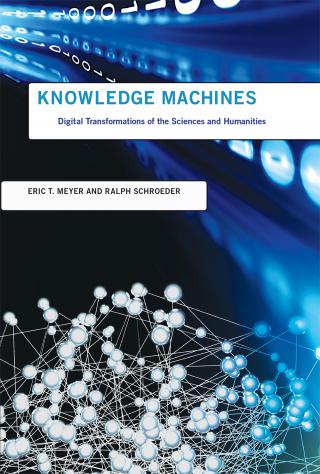Knowledge Machines

Part of Book at Lunchtime, a fortnightly series of bite-size book discussions, with commentators from a range of disciplines. Free, all welcome - no booking required. Join us for a sandwich lunch from 12:30, with discussion from 13:00 to 13:45.
Professor Eric T. Meyer (Senior Research Fellow, Oxford Internet Institute, University of Oxford) discusses his book Knowledge Machines with:
Dr Kathryn Eccles (Research Fellow, Oxford Internet Institute, University of Oxford)
Dr James Smithies (Director of King's Digital Lab and Module Convenor for Internships in the Department of Digital Humanities, Kings College London)
Lucie Burgess (Associate Director for Digital Libraries, Bodleian Libraries, University of Oxford)
About the book
In Knowledge Machines: Digital Transformations of the Sciences and Humanities, Eric Meyer and Ralph Schroeder argue that digital technologies have fundamentally changed research practices in the sciences, social sciences, and humanities. Meyer and Schroeder show that digital tools and data, used collectively and in distributed mode—which they term e-research—have transformed not just the consumption of knowledge but also the production of knowledge. Digital technologies for research are reshaping how knowledge advances in disciplines that range from physics to literary analysis.
Meyer and Schroeder map the rise of digital research and offer case studies from many fields, including biomedicine, social science uses of the Web, astronomy, and large-scale textual analysis in the humanities. They consider such topics as the challenges of sharing research data and of big data approaches, disciplinary differences and new forms of interdisciplinary collaboration, the shifting boundaries between researchers and their publics, and the ways that digital tools promote openness in science.
This book considers the transformations of research from a number of perspectives, drawing especially on the sociology of science and technology and social informatics. It shows that the use of digital tools and data is not just a technical issue; it affects research practices, collaboration models, publishing choices, and even the kinds of research and research questions scholars choose to pursue. Knowledge Machines examines the nature and implications of these transformations for scholarly research.
“Knowledge Machines draws upon a range of social theories of research and a set of key case studies in order to give a clear understanding of the ongoing transformations of research practices through Internet technologies. Its nuanced analysis of the differences between e-research projects and their overall commonalities is essential reading for those interested in e-research and big data.”
—Mike Thelwall, Professor of Information Science, University of Wolverhampton
“Knowledge Machines gives a rich empirical account of the implications of the Internet for academic research in the sciences, social sciences, and humanities. Like its sister publication *Virtual Knowledge: Experimenting in the Humanities and the Social Sciences*, it documents current practices in e-research and points the way forward to fundamentally novel ways of creating knowledge. This book is a formidable performance of the Oxford Internet Institute.”
—Paul Wouters, Leiden University, coeditor of Virtual Knowledge
“We are in the midst of a profound transformation in knowledge: not only its production, distribution, and use, but also its constitution and meaning. Knowledge Machines is an authoritative and insightful guide to this transformation, describing, analyzing, and speculating from a sound base of empirical work and social theory. Aware that they are writing in the midst of the maelstrom of change, the authors are careful to indicate alternative pathways, contingent possibilities, and tentative inferences. These give the reader a reasoned sense of where matters stand today, while providing ideas and evidence for thinking about the various courses events may take in the future. In all, Knowledge Machines is a smart and lucid book that lends insight into the defining transformation of our day.”
—Edward J. Hackett, Professor, School of Human Evolution and Social Change, Arizona State University, and editor of Science, Technology & Human Values
Free and all welcome. No advance booking required, please just come along and seats will be allocated on a first-come, first-served basis.
Contact name: Hannah Penny
Contact email: hannah.penny@humanities.ox.ac.uk
Audience: Open to all
Media: Knowledge Machines


